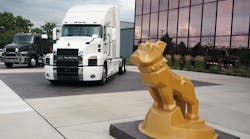ALLENTOWN, PA. Has the North American Class 8 truck market—which hit a record high for orders last month—peaked? It's possible, speculates Martin Weissburg, the new president of Mack Trucks, but for now, every indication is that demand will stay very high for at least a few quarters. And 2019 is looking likely to be a strong year for the market as well, the OEM predicts.
Weissburg took the reins at Mack on June 1, which he calls "the dream job of a career based in the heavy equipment industry," and says he and the company are keeping in close tabs with suppliers to be sure there's enough parts to keep the assembly lines rolling. The company isn't experiencing any shutdowns, but that requires constant vigilance.
"We have our share of challenges in a stretched supply chain. Mack Trucks is not immune to that," he told reporters in a meeting yesterday at the Mack Customer Center. "Just when you fix one [potential supply problem], there's another pain point that pops up."
On that note, he said Mack's truck production at its Lehigh Valley Operations in Macungie, PA, which boasts some 2,400 employees, "is at an all-time high" and the facility is putting out as many trucks as it can. Instead of speeding things up any further to get more trucks out the door, though, "if anything, I'd rather slow the line down to ensure quality," Weissburg noted. "We never let a truck out that's not ready."
He added that with competition extremely high among OEMs, any compromise in quality and decrease in truck reliability would only come back to haunt you. "We view any truck down as a crisis," Weissburg said.
Better fix
To help with that, since any truck lineup will have breakdowns, Mack's Uptime Center in Greensboro, NC takes calls and assists 24/7 if a Mack truck has a problem. That relatively new facility and service are part of what Mack sees as essential to new truck sales going forward, according to Jonathan Randall, senior vice president of North American sales at the company.
He said Mack has been testing out over-the-air updates with "several hundred" trucks from across Mack's lineup. Rather than having to bring a truck in to a dealership, OTA service can handle a variety of things like software fixes and updates and can be scheduled when the driver has some available time. As it's currently set up, the truck's ignition is switched off and back to "on" and the update/ service can be performed.
Mack began working with OTA service after studying truck repairs. The OEM found that the average time in the shop for trucks was four days, but the average repair took only four hours. So there's an opportunity to save fleets and drivers considerable expense by avoiding that shop visit.
"It's all about limiting breakdowns, but when downtime or dwell time occurs, it's about making it as little as possible," Randall said. With increasing computerization of heavy trucks, OTA service and updates are one approach to solving the problem.
The follow-up after the sale has also become a key point in this market for OEMs to differentiate themselves. "Buying a Mack truck is not just a point-in-time purchase," Weissburg said. "We're a relationship company, not just a vendor of trucks."
Investments
Mack has invested some $3 million in its Allentown Customer Center in the last few years and another $80 million in the Lehigh Valley Operations truck assembly plant. That's not a static thing: "There's always the need to spend more in a factory," Weissburg noted.
Mack's dealer network has also been making sizeable investments in shops, personnel, parts, and facilities, according to the company. All those elements of the supporting network have come to bear in this year of very high market demand.
Weissburg also contended Mack has been well-positioned with its product portfolio, including a fresh on-highway offering with the launch of the Anthem tractor last fall. It made for good timing, although he pointed out the company might've wished the launch came about six months earlier.
He said demand for the Anthem "has exceeded all our expectations." While he didn't get into specific figures, he and Randall said Mack has had twice as many orders for on-highway trucks so far this year than the number of those trucks the company delivered in all of 2017.
On-highway was a weaker point for Mack prior to this, and it's an area the OEM is looking to grow its market share. Randall noted that on-highway trucks is where all the frenzy has been this year in terms of truck-buying—so much so that other areas like construction, where demand has remained high but more level, have shrunk a bit as part of the overall sales equation. Still, another big part of Mack's sales continues to be the Granite, which has also seen recent updates and can be spec'd as a dump truck, mixer, tractor, and other configurations.
Also in terms of future preparation, Mack announced this spring it would begin testing a fully electric LR refuse truck with the New York City Dept. of Sanitation. "The first prototypes are in the works, and we're going to bring that out in late '19, early '20 for the first demo units," Weissburg said.
"This is coming," he added. "The conventional wisdom is that start-stop operations like refuse are going to be an absolute winner for electrifying trucks."
Another big year, with caveats
Mack hasn't released its predictions for the Class 8 market next year, but Weissburg said the company expects it will be another strong one. There are, however, forces that could constrain things.
That includes tariffs on materials needed to build trucks, he noted, and even if a manufacturer's particular supply lines aren't affected directly, "the tariffs have created an environment for other suppliers to raise their prices," Weissburg said. "So there's price pressure upwards," and overall costs could increase.
The labor market is also extremely tight, he added, with industrial jobs at a 17-year high. "We feel very fortunate we've been able to attract and retain the talent that we have," Weissburg said.
While Mack dealerships have made investments and upgraded facilities, he said "they have their challenges" with labor as well, such as finding and keeping the best technicians.
And of course, it's still difficult to fill all the driver's seats of those trucks—no matter how strong fleet orders and freight demand might be. The industry is short about 50,000 drivers overall, Weissburg noted, and that figure is poised to double.
On that note, he said the Anthem has done well. Though the truck "is a business tool and its first job is hauling freight," fleets that have purchased it have been able to use it as a driver recruitment tool at hiring events, he argued.
"We've had customers put it out front and say, 'If you come and work for us, you can drive that truck,'" Weissburg quipped.







